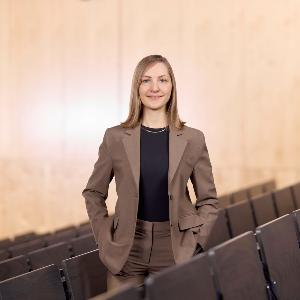Social Media: When algorithms control how we see the world
11 Apr 2025
Communication expert Anna Sophie Kümpel studies the impact of social media.
11 Apr 2025
Communication expert Anna Sophie Kümpel studies the impact of social media.

Newly appointed Professor Anna Sophie Kümpel knows from her own experience what it is to study at LMU. | © LMU/Stephan Höck
In social media, approval and hatred, real and fake news are often only a click apart. And how much of this is noticed by users can vary considerably.
“The content I see as a user depends largely on the algorithms on a given platform,” says Anna Sophie Kümpel. “These are based in part on my behavior as a user on the platform and the content with which I frequently interact. But at the same time, Instagram, TikTok, and all the others also have general rules about what kinds of content are shown. So, there is a heavy dependency on the platforms themselves.” This, Kümpel adds, can be seen from the development of Twitter/X: “The algorithms were recently changed such that content and actors on the political right now have a greater presence. At least potentially, that can also influence opinion-building processes.”
We have to assume that media effects are becoming more and more individualized, precisely because everyone is confronted with different content in a different context.Anna Sophie Kümpel , Chair of Communication at LMU’s Department of Media and Communication
Kümpel studies how social media are used and what impact they have. This, too, depends on the algorithms: “We have to assume that media effects are becoming more and more individualized, precisely because everyone is confronted with different content in a different context.”
Anna Sophie Kümpel has held the Chair of Communication at LMU’s Department of Media and Communication since October 2024. Her main focus is on the uses and effects of media, especially in the digital realm. She commenced her own studies here in 2008 and graduated with a master’s degree in communication in 2013. She earned her doctorate at LMU in 2018, remaining with the department as a postdoctoral researcher until 2020, when she became an Assistant Professor at TU Dresden. In 2024, she then had to choose between two offers: Berlin or Munich? Ultimately, she opted to return to her alma mater.
Kümpel is very happy to be back at LMU: “The Department of Media and Communication is a great place. It is very amenable, and collaboration between the staff is very good.” Since returning, she has also become a member of LMU’s interdisciplinary Open Science Center. “Transparency and openness are very important to me – not only in my own research, but also as key metrics for our research field as a whole.”
Kümpel's interest in the use of news content in social media was already at the forefront of her doctoral research. She chose Facebook as an example: “Back when I started my dissertation, it was still the main network for the younger generation. Since then, it has become a platform for older users.”
This kind of change is typical in her field of research: “So much is happening in social media, and at such a rapid pace that it is hard to keep up,” the LMU researcher admits. That is why she consciously and repeatedly takes a step back: “This gives me the opportunity to look at theoretical questions: What are the high-level attributes that characterize how people use information in social media? What impact do they have?” In addressing these questions, she develops research methods that can be applied across multiple platforms. She also continues to develop new ideas about how to properly model the increasingly individualized use of media in empirical projects.
One of her recent projects, funded by the German Research Foundation (DFG), explores how older adults perceive and use information on social media and messenger apps. In this project, she and her team are even reconstructing personalized feeds.
The algorithms have always pushed hate speech and disinformation because people react strongly to content that polarizes and stirs up emotions.Anna Sophie Kümpel, Chair of Communication at LMU’s Department of Media and Communication
Hate speech and disinformation are two of the less pleasant features of social media. “The algorithms have always pushed both aspects because people react strongly to content that polarizes and stirs up emotions,” Kümpel explains. “What is done to counter this depends not least on legal frameworks and, of course, on the platforms themselves.”
The communication researcher says she is “concerned” about recent developments, such as Meta CEO Mark Zuckerberg’s decision to remove independent fact-checking and replace it with community notes: “I see this as really problematic, because the work of fact-checking teams has been shown to play a role in combating disinformation and misinformation on social media. Contrary to what Mr. Zuckerberg says, this does not restrict freedom of speech: It actually strengthens it by making it clear to users what information they can trust.”